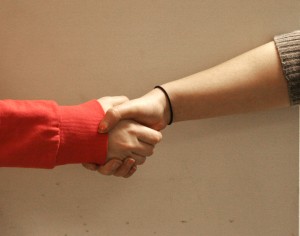
Drue Sokol, Photo Editor
Are you unsure about the intricacies of the college social scene? If you are, read on for a comprehensive guide on how to greet everyone from your closest friends to those people you’d really like to just avoid so you can begin to chip away at those pesky, unwritten rules.
The Lip Twitch
Otherwise known as the fail-safe, non-committal I’m-not-sure-if-you-know-me or I’m-not-sure-if-I-know-you-but-I-don’t-want-to-be-rude-greeting. Often mistaken for a facial tick, the “lip twitch” is small enough that it can’t be mistaken as overeager, but big enough that it will pass as a sign of pleasant acknowledgement.
Uses: People you’ve met once or twice, people you think you’ve met once or twice, that person you think you recognize but aren’t sure from where.
The Head Bob
One step up from the “lip twitch,” the “head bob” requires a bit more effort and therefore demonstrates a slightly higher level of acquaintance. As it still lacks a verbal component, it is mostly harmless to use with the general population.
Uses: That person you bonded with at that party last weekend, your lab partner from last year, people you used to be friendly with but somehow stopped hanging out with.
The Nod and Speak
The addition of verbal communication in this greeting indicates a relatively regular series of interactions between the two parties, whether in a personal or professional (college student definition) setting.
Uses: The president of that club you go to sometimes, your lab partner from last year that you kind of, maybe, had a thing for, that person you wish you were friends with but don’t really know that well yet.
The Speak and Wave
Now that we have decided to move away from the head, it becomes clear that a much greater social bond is present. The “speak” is more animated and, if the recipient is lucky, may be accompanied by a cheery smile. The “wave” is small and timid, but no less kind.
Uses: That person you just started hanging out with, the president of that club you go to on a regular basis, that professor you wish you knew better.
The Speak, Wave and Shudder
Similar to the “speak and wave” with the exception being that you have no desire to interact with this person, but you must, either because of a social obligation, school-related purpose or both. The “shudder” can manifest itself in anything from a nervous, distracted laugh to an actual, physical twitch.
Uses: That person you were trying to avoid, but who saw you anyway, that kid who can barely move a conversation beyond “hello,” your partner from a class project who you know is going to ask you about your portion of the work that you definitely haven’t finished yet.
The Handshake
Whatever you do, don’t be a dead fish.
Uses: Your boss, that person you want to make think that you exhibit professionalism, President Seligman.
The Speak and Wave (Classic)
This greeting represents true cordiality. The “speak” is clear, confident and sociable and the “wave” is obvious, lively and sincere.
Uses: That friend whose schedule just doesn’t match up with yours so you never see each other, that friend you want to stop and chat with but can’t because you’re in a hurry, that guy you talk to in cla — oh wait — that’s not him. Oops.
The Stop and Speak
Provided that you actually have time to spare, the “stop and speak” implies an actual desire for human interaction. Conversation can range from how global warming is ruining Rochester winters to how you had to take Pepto-Bismol last night for an upset stomach.
Uses: Actual friends, people who will stop and talk to everyone, your parents.
The Stop and Squeeze
Whether you’re greeting your significant other at the airport after he or she has returned from a semester abroad or your friend who just happens to be a touchy-feely kind of person, the “stop and squeeze” is the ultimate show of friendship.
Warning: Not everyone will respond well to this intimacy, so use with caution.
Goldin is a member of the class of 2013.

